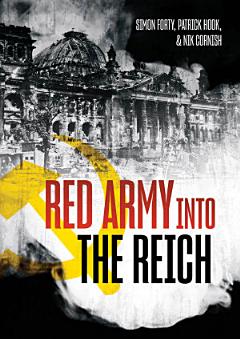An illustrated history of how the Red Army pushed west and into Berlin in 1945 during World War II.
The last year of the war saw Russian offensives that cleared the Germans out of their final strongholds in Finland and the Baltic states, before advancing into Finnmark in Norway and the east European states that bordered Germany: Poland, Czechoslovakia and Hungary. By spring 1945 the Red Army had reached to Vienna and the Balkans, and had thrust deep into Germany where they met American, French and British troops advancing from the west. The final days of the Third Reich were at hand. Berlin was first surrounded, then attacked and taken. Hitler’s suicide and his successors’ unconditional surrender ended the war.
For writers and historians who concentrate on the Western Allies and the battles in France and the Low Countries, the Eastern Front comes as a shock. The sheer size of both the territories and the forces involved; the savagery of both weather and the fighting; the appalling suffering of the civilian populations of all countries and the wreckage of towns and cities—it’s no wonder that words like Armageddon are used to describe the annihilation.
Red Army into the Reich combines a narrative history, contemporary photographs and maps with images of memorials, battlefield survivors and then & now views. It may come as a surprise to the western reader to see how many memorials there are to Russia’s Great Patriotic War and those to the losses suffered by the countries who spent so long under the murderous Nazi regime.
Praise for Red Army into the Reich
“If you have any interest in understanding the final cataclysm that overtook the Third Reich and delineated the hows and whys of the Cold War—and Eastern Europe after the collapse of the Soviet Union—Red Army into the Reich will give you a glimpse into a generally underreported past...a small slice of heaven for the East Front fan.” —ARMOR Magazine
“Carries the reader into the Eastern Front with clear writing, good maps, and lavish illustration. Many of the photographs are accompanied by images of how the scene they depict appears today.” —WWII History Magazine
“A better-illustrated recent volume would be hard to find, especially one that covers the breadth of Red Army combat operations in the third period of the war.” —Journal of Slavic Military Studies

